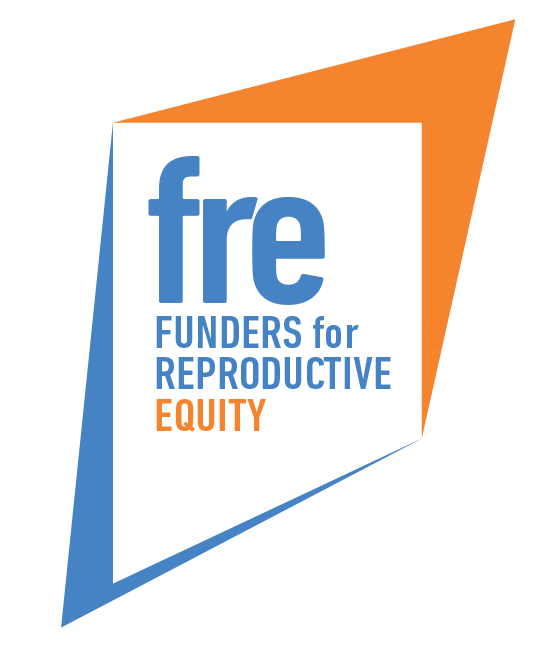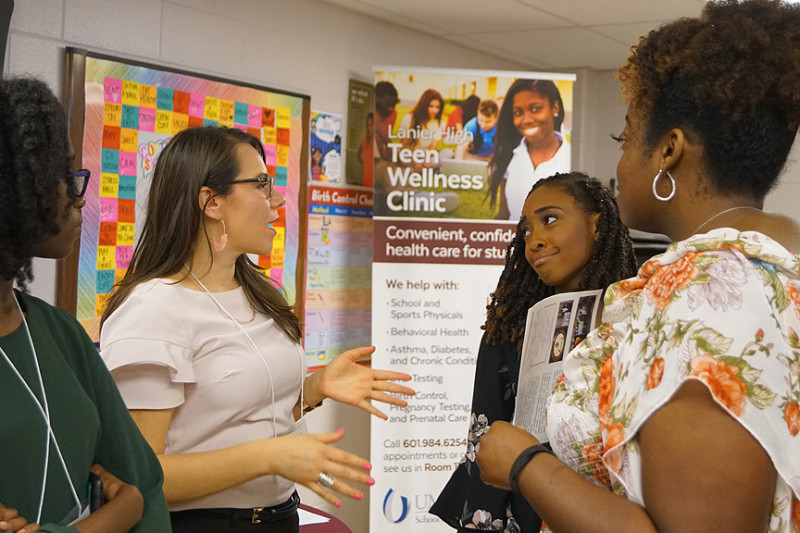June 2019 learning journey for funders to the U.S. South, co-convened by Funders for Reproductive Equity and the Women’s Foundation of Mississippi
As goes the South so goes the nation… --W. E. B. Du Bois
What happens when two dozen colleagues get on a bus and travel hundreds of miles together through the U.S. Deep South? Funders for Reproductive Equity and the Women’s Foundation of Mississippi found out in June 2019 when they co-convened “Leading from the South: Reproductive and Racial Equity in Alabama and Mississippi,” a learning journey for funders.
Focused on both reproductive and racial equity, the journey had three central goals:
- Deepen understanding of the political barriers and cultural assets of two Deep South states.
- Foster informed appreciation of the complexities influencing reproductive and racial equity.
- Strengthen relationships among FRE members.
View photos from the journey by clicking on the image below:
“We are here to witness the layered and intersecting oppressions of white supremacy, racism and sexual and reproductive injustice—white male control over women’s bodies and strict policing of gender and sexual expression,” Denise Shannon of FRE told participants as they set out on the journey. “[Here], we can really learn from the ways people are pushing back and rising above.”
Latisha Latiker of the Women’s Foundation of Mississippi advised, “…[M]ore attention needs to be paid to the Deep South and its people [--]…the deep history of struggle, pain, and suffering, but also the deep history of perseverance, inspiration, and victory of its people, especially the people of color. …[W]hen funders talk about reproductive justice and reproductive equity, they should understand what that term really means. …[T]hey can fund all the programs in the world for abortion access, but if the only clinic available to a woman is at least 200 miles away from where she lives, she doesn’t have access to transportation, she may be working two jobs and have children to look after; what is the point? Access in Cary or Mound Bayou, Mississippi is vastly different then access in Washington, DC or even Atlanta.”
Learning from advocates in Mississippi and Alabama…
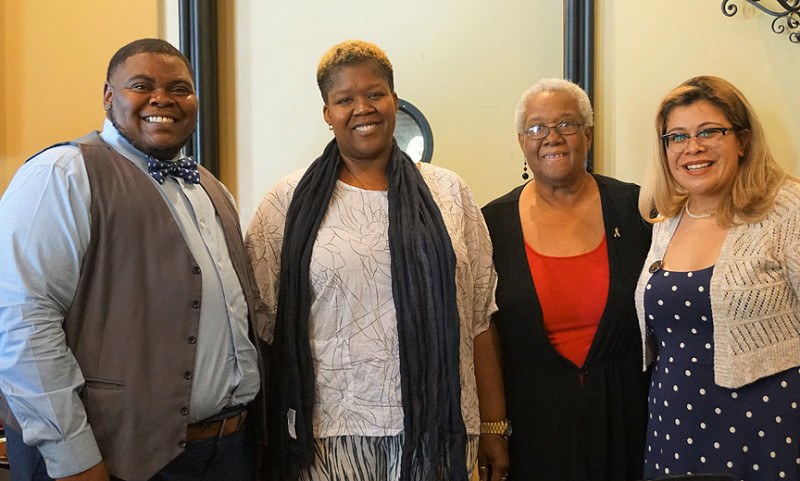
Alabama-focused panelists (L-R): Quentin Bell, The Knights & Orchids Society; Dr. Keecha Harris, Keecha Harris and Associates; Sophia Bracy Harris, Federation of Child Care Centers of Alabama; Amanda Reyes, Yellowhammer Fund
The determination and activism of champions in these states can be informative to funders preparing for the surge of legal barriers that would limit access to abortion, contraception and preventive care in the region. Mississippi and Alabama boast long-standing histories of grassroots activism and community resilience.
At Cary Christian Center in Cary, Mississippi, we heard how the organization’s parent child ministry has been instrumental in turning around Sharkey County’s infant mortality rate from the state’s highest to its lowest. In addition to providing prenatal education and helping pregnant people enroll in Medicaid, project coordinator Nickie Parker will even drive clients to obstetrician visits herself—usually requiring a three-to-five-hour car trip. The visit also gave us a glimpse of everyday life in a rural area contending with high rates of poverty and unemployment, no public transportation and long distances to reach grocery stores and hospitals.
Teen health was also a focus of the trip. The group visited the Lanier High School Teen Wellness Clinic in Jackson, Mississippi, a school-based clinic that offers youth-friendly primary and preventive health care, social services and behavioral health services to low-income African-American students. At the Delta Health Center in Mound Bayou, Mississippi—a town founded in 1887 by formerly enslaved people as an independent black community—we focused particularly on the delivery of teen-focused sex education and services in a rural context. Experts from the Delta Health Center, Teen Health Mississippi and the Tri-County Workforce Alliance presented how the nation’s first federally qualified health center fills the gap in sex education in the area by giving teens a chance to meet one-on-one with physicians to discuss safe sex and related topics.
Participants also learned about sexual and reproductive health and rights that are increasingly affected by legal restrictions advanced by extremists. In Alabama, for example, the Yellowhammer Fund provides abortion funding, battles stigma and counters the work of crisis pregnancy centers with a reproductive justice resource center offering free condoms, menstrual supplies, pregnancy tests and baby gear. In a context of anti-trans stigma and violence, the Knights & Orchids Society uses a reproductive justice framework to address all kinds of needs through such services as a food bank and e-zine for youth.
… and civil rights icons
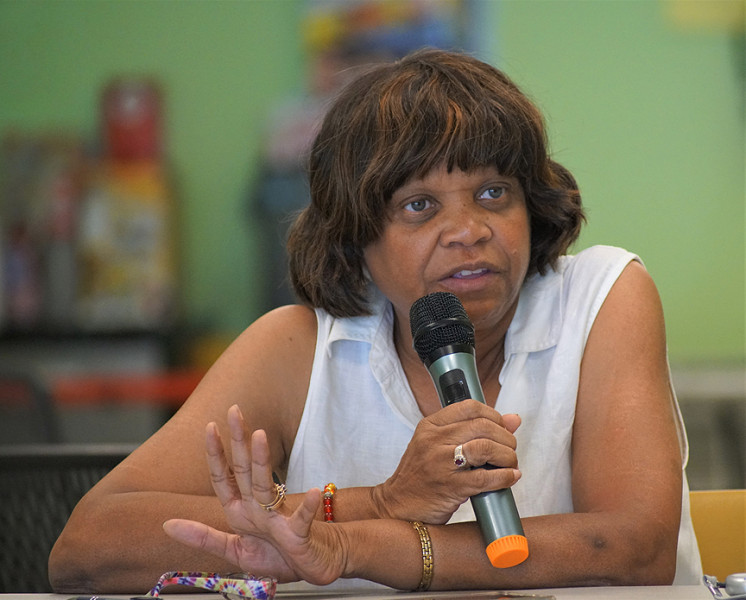
Gloria Dickerson, We2gether Creating Change
Participants also had the honor of meeting with civil rights leaders. In Drew, Mississippi, Gloria Dickerson described integrating the local high school as a teen during the 1960s; Ms. Dickerson returned to her hometown upon her professional retirement in 2009 to found We2gether Creating Change, and organization dedicated to helping people break the cycle of poverty.
At the historic NAACP offices in Jackson, Mississippi-- where Medgar Evers once worked-- the group heard from a panel that included Mississippi Votes, Mississippi Black Women’s Roundtable and Planned Parenthood Southeast about efforts to boost civic engagement and voter participation. A recurring theme? The overlap between reproductive and civil rights work. When Planned Parenthood Southeast advocates go door-to-door, for instance, they provide information about topics such as breast cancer and ask residents if they’re registered to vote.
Connecting with the country’s history of racial apartheid, struggle and resilience
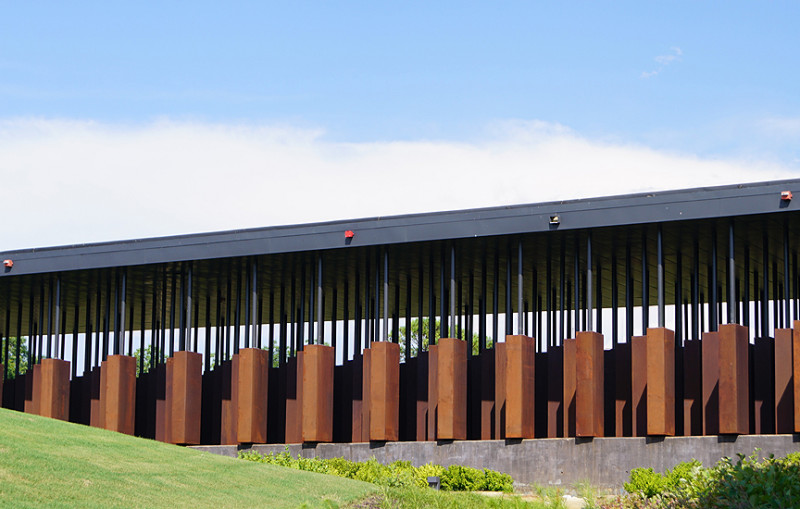
National Memorial for Peace and Justice, Alabama
In addition to learning from activists and living legends of the civil rights struggle, the group engaged with our nation’s history—and legacy—of racial apartheid, visiting the Mississippi Civil Rights Museum, Fannie Lou Hamer Memorial, National Memorial for Peace and Justice and the Legacy Museum. The last of these traces the repeated metamorphosis of the U.S. system of human enslavement into convict leasing, racial terror, segregation and, today, mass incarceration.
Racial justice issues were purposefully centered throughout the trip, manifesting our commitment to intersectional analysis and to the lived experiences of the many activists and organizations that received us. As with virtually every part of the United States, it is impossible to understand the current state of sexual and reproductive health, rights and justice in the U.S. South without considering both the history and legacy of human enslavement and racial apartheid. The impact of this aspect of the journey, as described by FRE Board Co-Chair Joanna Lauen of the Irving Harris Foundation, was profound:
Going to the South gave us an opportunity to sit more closely with our country’s history, the pain and the trauma that racism has caused and the role it continues to play in people’s health and well-being. Philanthropy has an obligation to deepen its understanding around the impact that racism and white supremacy have had and continue to have.
FRE members, log in to the Members Only section of our site to view materials from the trip and post-journey reflections by participants, including:
document Latisha Latiker, Women’s Foundation of Mississippi - SLJ Reflections (29 KB)
document Mariama Diallo, Ford Foundation - SLJ Reflections (24 KB)
document Leticia Corona, Hewlett Foundation - SLJ Reflections (27 KB)
document Keylin Rivera, Institute for Southern Studies - SLJ Reflections (26 KB)
document Joanna Lauen, Irving Harris Foundation - SLJ Reflections (27 KB)
document Elise Belusa, Tara Health Foundation - SLJ Reflections (28 KB)
For help logging in, contact FRE Operations Director Narada Lee.
Funders for Reproductive Equity is a network of 50+ public and private, U.S.-based charitable foundations whose primary purpose is making grants in support of sexual and reproductive health, rights and justice globally.
The Women’s Foundation of Mississippi is the only grantmaking and advocacy organization in the state entirely dedicated to funding programs that improve the lives of women and girls statewide. Our mission is clear: economic security for women. Women have greater opportunity for upward mobility and economic sustainability when they can plan for pregnancy, earn a degree or receive relevant job training, and pursue a viable career with a livable income. When women thrive, Mississippi thrives.
Want more information about this Southern Learning Journey, or about FRE’s work with the sexual and reproductive health, rights and justice funding community? Contact .
